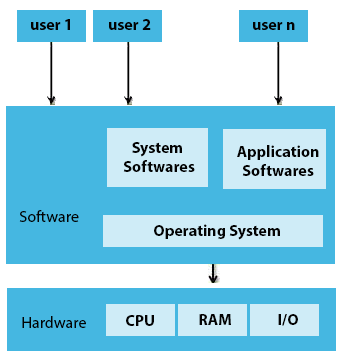Home >>Operating System Tutorial >Operating System Overview
Operating System Overview
Operating System Overview
An Operating System ( OS) is a computer user-hardware gui. An operating system is a programme that performs all critical tasks such as file management, memory management , process management, input and output handling, and controlling peripheral devices such as hard disks and printers.
Some popular Operating Systems include Linux Operating System, Windows Operating System, VMS, OS/400, AIX, z/OS, etc.
Definition
An operating system is a programme that serves as the client-computer hardware interface and controls the execution of all kinds of programmes.

Below are some of the Operating System's essential features.
- Memory Management
- Processor Management
- Device Management
- File Management
- Security
- Control over system performance
- Job accounting
- Error detecting aids
- Coordination between other software and users
Memory Management
Memory management refers to the Primary Memory or Main Memory management. Primary memory is a vast array of words or bytes with each word or byte having their own address.
Main memory provides fast storage, which can be directly accessed by the CPU. To execute a programme it must be in the main memory. An operating system performs the following memory management tasks –
- Keeps tracks of primary memory, that is, which part of it is used by whom, which part is not in use.
- In multi-programming, the OS determines when and how much memory will get from the operation.
- Allocates the memory when a process asks for it.
- De-allocates the memory when a process doesn't need it anymore or is terminated.
Processor Management
In multiprogramming environment, the OS determines when and for how much time the processor gets. This feature is called scheduling method. An Operating System carries out the following processor management activities-
- Keeps processor tracks, and process status. The software which is responsible for this role is called the traffic controller.
- Allocate Processor (CPU) to a process.
- De-allocates processor when no further process is needed.
Device Management
An operating system manages the communication with devices through their respective drivers. It performs the following system management tasks-
- Keeps all devices tracked. An I / O controller is regarded as the programme responsible for this task.
- Decide can process the system gets when and for how long.
- Allocates quickly to the computer.
- De-allocates devices.
File Management
For easy access and use a file system is usually organised into directories. These directories can include files, as well as other directions.
An Operating System performs the following file management tasks −
- Keeps track of information, location, uses, status etc. The aggregate facilities are sometimes referred to as filesystems.
- Decide who'll get the resources.
- Assigns resources.
- De-allocation of resources.
Other Important Activities
Below are some of the essential tasks an operating system carries out −
- Security −It prevents unauthorised access to programmes and data through the password and similar other techniques.
- System Performance Control −Recording delays between a service request and system response.
- Job accounting −Keep track of the time and resources employed by different workers and users.
- Error detection aids −Dumps generation, traces, error messages, and other debugging and error detection aids.
- Coordination between other applications and users −Coordination and assignment to the different users of computer systems of compilers, interpreters, assemblers and other applications.
